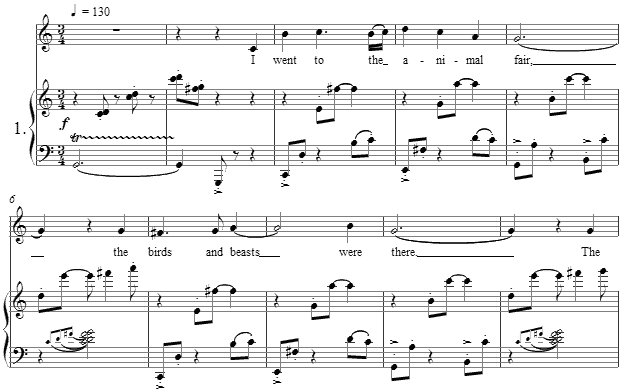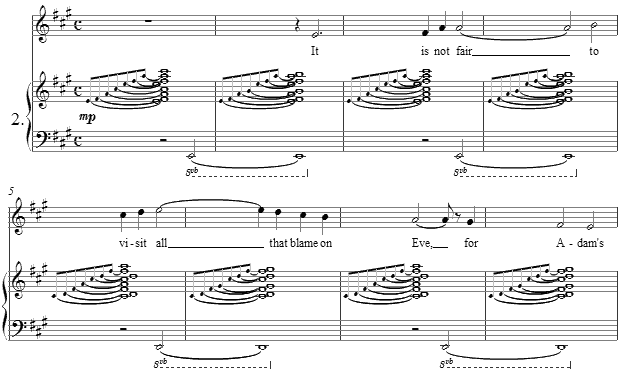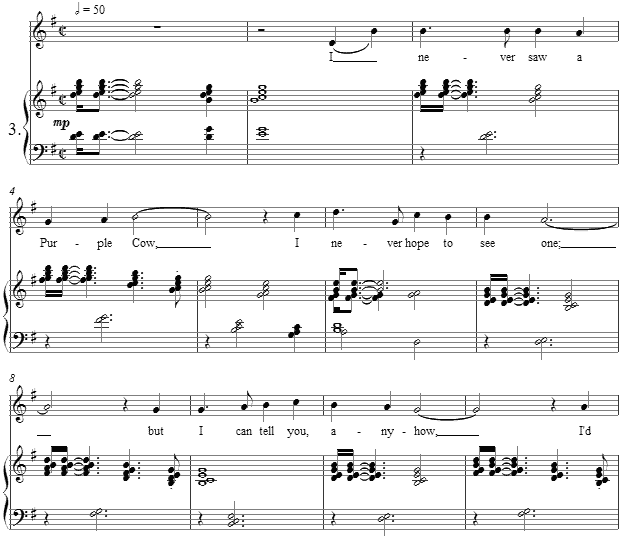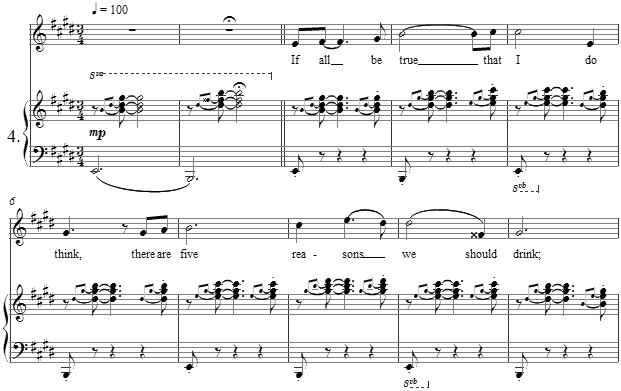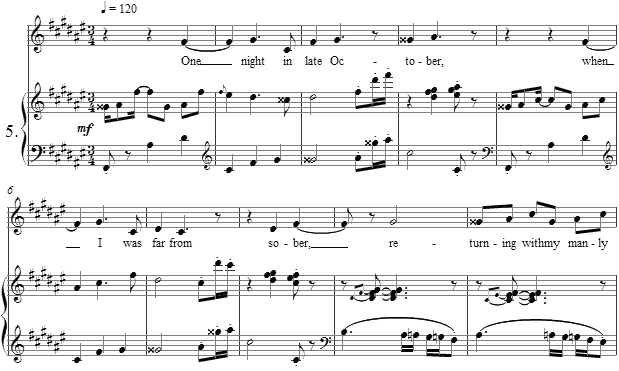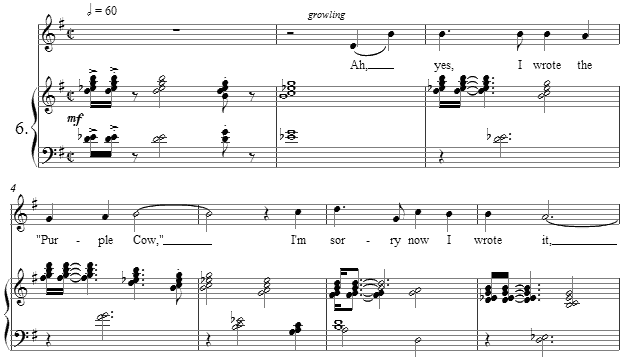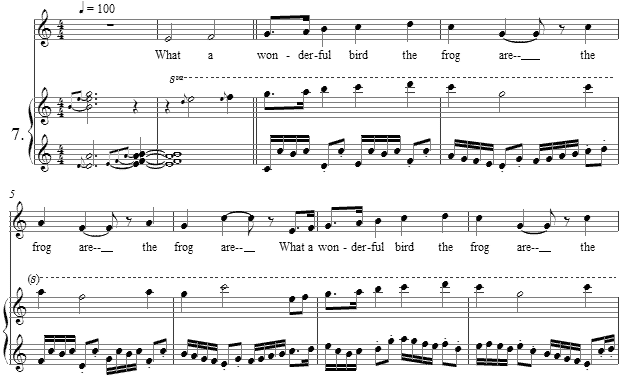Music and Texts of GARY BACHLUND
Vocal Music | Piano | Organ | Chamber Music | Orchestral | Articles and Commentary | Poems and Stories | Miscellany | FAQs
Seven Silly Little Songs - (2009)
texts of Henry Aldrich, Gelett Burgess, Oliver Hurford and anonymous authors
for medium voice and piano
i. Animal Fair - [ 2 pages, circa 1' 00" ]
I went to the animal fair,
The birds and the beasts were there.
The big baboon. by the light of the moon,
Was combing his auburn hair.
The monkey, he got drunk,
And sat on the elephant's trunk.
The elephant sneezed and fell on his knees,
And what became of the monk, the monk?
ii. Eve, apropos de Rien - [ 1 page, circa 40" ]
It is not fair to visit all
The blame on Eve, for Adam's fall;
The most Eve did was to display
Contributory negligé.
iii. The Purple Cow - [ 1 page, circa 40" ]
I never saw a purple cow;
I never hope to see one;
But I can tell you, anyhow,
I'd rather see than be one.
iv. Reasons for Drinking - [ 1 page, circa 40" ]
If all be true that I do think,
There are five reasons we should drink;
Good wine -- a friend -- or being dry --
Or lest we should be by and by --
Or any other reason why.
v. Judged by the Company One Keeps - [ 2 pages, circa 1' 10" ]
One night in late October,
When I was far from sober,
Returning with my load with manly pride,
My feet began to stutter,
So I lay down in a gutter,
And a pig came near and lay down by my side;
A lady passing by was heard to say:
"You can tell a man who boozes,
By the company he chooses,"
And then pig got up and slowly walked away.
vi. The Purple Cow Again - [ 1 page, 30" ]
Ah, yes, I wrote the "Purple Cow"—
I'm sorry, now, I wrote it;
But I can tell you anyhow
I'll kill you if you quote it!
vii. The Frog - [ 4 pages, circa 2' 30" ]
What a wonderful bird the frog are --
When he stand he sit almost;
When he hop, he fly almost.
He ain't go no sense hardly;
He ain't got no tail hardly either.
When he sit, he sit on what he ain't got almost.
[ 12 pages, circa 6' 10" ]
This collection of texts flopped out, so to speak, of a poetry anthology which I happened upon in a library. Yankee Doodles, a Book of America Verse, ed. Ted Malone, New York, Whittlesey House, 1943. Much of the collection is public domain material, with the occasional copyright noted. These all fall within the public domain. Malone noted, "the most typical, ingenious, and revealing example of American handiwork is what is commonly called 'the doodle.' Unscientific investigations have too often confused doodles with falderal, fiddle faddle, and other important but dissociated topics for scholarly research." Humorously, the text by Aldrich is in fact British and not officially representative of American -- or as Malone wished to note, Yankee -- doodle. Even so, it is charming and worth the revisit.
i. Animal Fair (anonymous)
The simple and humorously awkward accompaniment separates gestures of the diatonic scale by octave displacement. Many runs and trills decorate this "fair."
ii. Eve, apropos de rien (Oliver Hurford)
Long arpeggios and a few solitary deep bass notes provide the arpa background for a tongue-in-cheek commentary on this side of the tale of Adam's fall through the seductive offices of some leafy negligee.
iii. The Purple Cow (Gelett Burgess)
Frank Gelett Burgess (1866-1951) was an artist, art critic, poet, author, and humorist. His poem, The Purple Cow, first appeared in volume 1, number 1 (1895) of a "new" monthly magazine The Lark, published in San Francisco. William Doxey as publisher, The Lark was edited and written primarily by Burgess with , who took great delight in creating pseudonyms for himself. The poem found great contemporary popularity, and was included in Modern American Poetry (1919), edited by Louis Untermeyer.
iv. Reasons for Drinking (Henry Aldrich)
Henry Aldrich (1647–1710) was an English theologian and philosopher. Educated at Westminster School, in 1662, he entered Christ Church, Oxford, and in 1689 was made Dean. By 1692, he was Vice-Chancellor of the University of Oxford, and in 1702, he was appointed Rector of Wem in Shropshire.He also composed a number of anthems and church services, and re-set music of Palestrina and Carissimi to English texts. Yet this text in English translation is, in Aldrich's original, in Latin.
Si bene quid memini, causae sunt quinque bibendi;
Hospitis adventus, praesens sitis atque futura,
Aut vini bonitas, aut quaelibet altera causa.
v. Judged by the Company One Keeps (anonymous)
Another anonymous text, this lilting setting with its leaning lower neighbors and slight syncopation hiccup lightly through the scene's unfolding.
vi. The Purple Cow Again (Gelett Burgess)
As Burgess had become too associated with his popular "cow" a brief four lines long, he penned this alternative curse in verse, properly titled Confession: and a Portrait Too, Upon a Background that I Rue, published in The Lark, number 24 (1897). The title of the song is my simple amusement that, no matter Burgess' threat, here are his poems again -- something I think he actually had in mind.
vii. The Frog (anonymous)
Flowing with seemingly bad grammar and coarse contractions for its time, this little gem bubbles with its own humor, for which a longer short setting called out with a quasi-strophic setting, the opening repeated at the end as the vocal range rises to its final tonic as a button for the end of this set of silly songs.
Ted Malone as editor of the anthology from which these texts are drawn observed, "Because our Yankee sense of humor has a boisterous quality throughout, you will find much laughter in the book. Because our optimism is so near the surface, you will find our philosophy sometimes verging on the edge of hokum." (page vi) Let these be hokum, then, and boisterous too.
The score for Seven Silly Little Songs is available as a free PDF download, though any major commercial performance or recording of the work is prohibited without prior arrangement with the composer. Click on the graphic below for this piano-vocal score.
